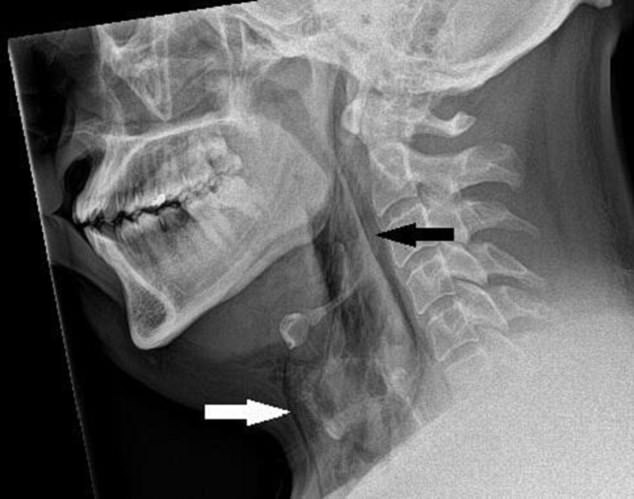- Healthy young man suffered the injury because air collected in his neck & chest
- Tear in the windpipe can be life-threatening, but in this case was not lethal
- READ MORE: Atish-ow! Holding your nose when you sneeze could kill you
A young man with a history of allergies suffered a serious tear in his windpipe after attempting to ‘hold in’ a sneeze.
British doctors, who reported the case in the British Medical Journal, said it was the first documented instance of a stifled sneeze leading to the injury – which can be life-threatening.
The experts said that suppressing the reflex by closing the nose and mouth caused pressured air to escape into the man’s neck tissue and chest, ripping the delicate tissue.
A tear to the windpipe, known medically as a tracheal tear, is more commonly caused by injury during or after surgery to remove the thyroid gland.
This is the tiny butterfly-shaped organ in the neck that controls several bodily processes including metabolism and energy levels.
It is also commonly seen following the insertion of a breathing tube – roughly one in every 20,000 patients see this complication – or a stent in the esophagus.

The scan shows air that is within tissues in the neck, causing a potentially dangerous tear in the windpipe
In the most recent case, reported by doctors at Ninewells Hospital in Dundee, Scotland, the patient visited the hospital complaining of severe neck pain related to sneezing.
Doctors also noticed a faint cracking sound when they felt his neck, which the man could not move properly.
Scans revealed a small tear in the man’s windpipe measuring about the width of a sesame seed.
In severe cases, tears to the trachea can cause the airways to narrow, causing life-threatening breathing problems. Serious infections are also common.

A CT scan of the man’s neck revealed concentrations of air in surrounding tissues as a result of the tear, which the white arrow points to
Injury to the windpipe is rare and is typically spotted when patients suffer symptoms of respiratory distress.
In the recently reported case, pressure in the airways shot up to 20 times higher than normal, due to the impact of holding in the sneeze.
Doctors said: ‘We suspect the trachea perforated due to a rapid build-up of pressure in the trachea while sneezing with a pinched nose and closed mouth.’
Doctors treating a trachea tear would consider surgery if the patient cannot breathe on their own or if the tear has extended into the space around the lungs.
An operation is also needed if there is a continuous build-up of air beneath the skin or within the chest.

The man in the report closed their mouth and nose while sneezing, causing the pressure in his airways to shoot up dramatically—up to 20 times higher than normal
But because the man’s tear was small and his blood pressure and respiratory rate were normal, surgeons chose not to perform surgery.
Instead, the man was treated with over-the-counter pain and fever reducer paracetamol, as well as codeine.
And five weeks later the tear had healed itself thanks to the immune system’s natural repair processes.
The man was prescribed anti-allergy medication including a steroid nasal spray and a decongestant to treat his congestion.
He remained in the hospital for 48 hours, but the man did not experience any further health complications.
Doctors ordered him not to stifle sneezes anymore and to avoid exercise for two weeks.
A follow-up scan a little over a month later showed the problem had completely resolved itself.
A tracheal tear is not the only injury that can arise from stifling a sneeze.
Doctors in the UK reported a case in 2018 of a man who suffered a severe tear in his pharynx – a tube in the neck that helps to breathe and digest food – as a result of holding in a sneeze.
The doctors warned that stifling sneezes ‘should be avoided, as it may lead to numerous complications such as pneumomediastinum [air trapped in the chest between the lungs], perforation of tympanic membrane [perforated eardrum] and even rupture of cerebral aneurysm [potentially fatal bursting blood vessels in the brain].’
